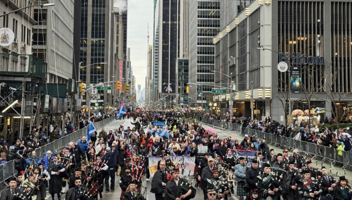Congratulations! Now that you have been granted Indefinite Leave to Remain (ILR), you can apply for British citizenship. This process is known as ‘naturalisation’ and concludes your immigration journey.
-
What is the difference between Indefinite Leave to Remain and citizenship?
-
Do I need to apply for citizenship?
-
Naturalisation process
-
Married to a British citizen
-
Present in UK 3 years prior to submission
-
Absences not exceeding 270 days / 90 days
-
Free from immigration control
-
Good character requirement
-
English language test and 'Life in the UK' test
-
Children
-
Costs and timescales
-
How can we help?

We understand that the immigration process can be very complicated and stressful. That's why we take the time to understand your particular situation and give you the help you need.
Roisin Dugan -
Solicitor
IMMIGRATION & VISAS
+44 (0)141 273 6947
roisin.dugan@burnesspaull.com
What is the difference between Indefinite Leave to Remain and citizenship?
Both allow you to live and work in the United Kingdom indefinitely, free from immigration time restrictions. You can also access public services and healthcare with both. However, the difference is that ILR does not grant you the right to vote, hold public office or apply for a British passport. You may also lose your Indefinite Leave to Remain status if you have been absent from the UK for more than two years.
Do I need to apply for citizenship?
No, citizenship is entirely optional and it comes down to personal choice.
If you are considering naturalising as a British citizen, you must check that your country of origin allows dual nationality otherwise you may lose your existing citizenship.
Naturalisation process
Naturalisation, unlike British citizenship acquired through birth or a British parent, is not an automatic entitlement. It is seen as a privilege and not a right, and applications are granted on a discretionary basis.
Section 6(2) of the British Nationality Act 1981 sets out the requirements for naturalising as a British citizen if you are married to a British citizen. If you are not married to a British citizen then section 6(1) applies, however this article will focus solely on spouses of British citizens.
Married to a British citizen
If you are at least 18 years old, hold Indefinite Leave to Remain or a right of permanent residence in the UK, and are married to a British citizen then you may be eligible to naturalise as a British citizen immediately. You must be of sound mind and understand that you are applying for British citizenship.
Present in UK 3 years prior to submission
You must have been physically present in the UK three years prior to submitting your application to step out of Indefinite Leave to Remain and continue on with your application for British citizenship. This is calculated as the day after submission minus three years. For example, if you submit your application on 1 December 2023, you must have been physically present in the UK on 2 December 2020.
In exceptional circumstances such as illness or covid travel restrictions, your application may still be granted. Further, the decision maker may establish a later date to allow you to meet the requirement and will consider your application on, or after that date.
Absences not exceeding 270 days / 90 days
You must not have been absent from the UK for more than 270 days in three years prior to the date of application. In addition, you must not have been absent for more than 90 days in the twelve months prior to the date of application.
Absences can be assessed through passports, travel documents, Home Office records or employers’ letters, tax and National Insurance letters. You may still be eligible if you exceed the absence threshold and our team can help determine whether your application is likely to succeed.
Free from immigration control
You must be free from immigration time restrictions. You will meet this condition if you hold Indefinite Leave to Remain, settled status under the EU Settlement Scheme, or you have a right to abode in the UK. Irish citizens are also considered settled from the date of arrival in the UK. You can provide your Biometric Residence Permit (BRP), Unique Application Number (UAN), passport or letter from the Home Office as proof of your permission to remain permanently in the UK.
You will not meet this requirement if you are on immigration bail, in immigration detention or have breached immigration laws in the three years before making the application.
Good character requirement
In order to be eligible for naturalisation and take the next steps from your status as Indefinite Leave to Remain, you must be of good character. This means you must observe UK laws and show respect for the right and freedom of its citizens. Good character looks at your background including criminality, terrorism, notoriety, deception, dishonesty, and financial soundness.
You can provide evidence of your community ties, charitable work, and positive contributions to society.
English language test and ‘Life in the UK’ test
You must meet the English language requirement at minimum level B1 CEFR. You will automatically meet this requirement if you are a national of a majority English speaking country such as the United States of America or Canada.
You will also meet the requirement if you have a UK degree or obtained a degree outside the UK that was taught or researched in English. Alternatively, you can pass an English language test from an approved Home Office test provider.
To conclude the process, you will also need to pass the Government ‘Life in the UK’ test (£50). You are exempt from sitting this if you are under 18, over 65, have passed it in a previous application (e.g., Indefinite Leave to Remain application) or you have a long-term physical or mental condition.
Children
Your child will automatically become a British citizen if they were born in the UK to a British or settled parent. For more information on children and their rights to British citizenship, please see our citizenship page.
Costs and timescales
The application costs £1580. You will normally receive a decision within six months, although some applications may take longer.
It is important to note that once you have naturalised as a British citizen, you will not be issued with a British passport. You must apply for this separately and pay an additional passport fee of £82.50.
How can we help?
The path to British citizenship is dotted with hurdles and failure to meet any of the above requirements can result in an automatic refusal. However, our team of immigration and nationality experts are here to guide you through the process from Indefinite Leave to Remain to British citizenship and help draft a successful application.
If you are the beginning of settlement journey, please see our “how to apply” series on spouse and family visas.
Watch our videos for further help on the immigration process:
Written by
Related News, Insights & Events

A US-UK trade deal would be great news for Scottish businesses – but travellers should prepare for intensified screenings at the US border
Amid the uncertainty caused by the rapidly evolving tariff regime, there have been consistent and positive noises from the US and UK governments about the potential for a US-UK trade deal.

Youth Mobility – the future of European visa travel?
With talk of expanding the Youth Mobility Scheme and a proposal from the European Commission, this blog explores what this could mean for young travellers and workers from the UK and EU.

Expansion of Right to Work checks: What you need to know
This blog discusses the UK government's tougher stance on immigration compliance, particularly around right to work checks.





